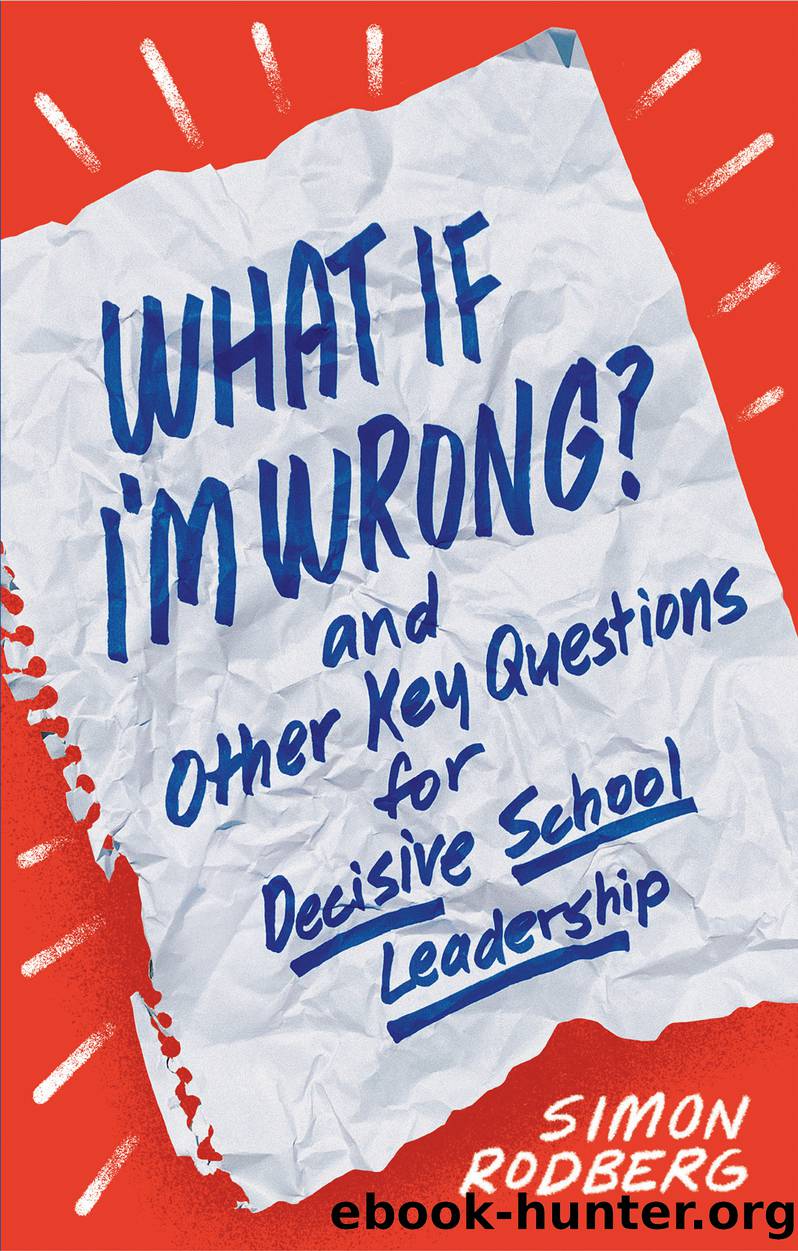What If I'm Wrong? and Other Key Questions for Decisive School Leadership by Rodberg Simon;

Author:Rodberg, Simon; [Rodberg, Simon]
Language: eng
Format: epub
Publisher: Association for Supervision & Curriculum Development
Published: 2020-08-02T00:00:00+00:00
Getting an Outside View About Your Teachers' Time
Bored office workers sometimes make up work to seem busy. But nobody at a school has to make up work to do; the things that feel absolutely crucial are never ending. Any time we ask teachersâor schoolsâto do something new, we need to ask, at what cost?
You may want teachers to meet across teams, provide a new report to parents, or implement a new program. These may all be good things to do. But unless you imagine that teachers have extra time in their days (with or without students), all come with a downside: they will take away from things teachers are already doing. That may be other meetings, other phone calls to parents, or other programs; that may be exercise, family time, or Netflix. Or sleep! Something will get squeezed. Sometimes it's quality: the new program and the old one are both implemented, but neither well. Sometimes it's workâlife balance; as I know from my own experience, there are charter schools that get young teachers to work 12-plus hours a day (but never for many years). Usually, the trade-off is with whatever the individual teacher decides is the lowest priority. I spoke to one elementary principal who knew her teachers were supposed to be e-mailing parents weekly but weren't; she knew they were supposed to be checking students' book baggies but weren't; she knew they were supposed to be making students keep reading logs but weren't. The principal knew she was asking too much of teachers and knew they weren't keeping up. She knew there were trade-offs. She just refused to make the trade-offs herself.
If there is something you want teachers, or other staff, to do, and if you are willing to recognize the reality of trade-offs, you have three possible directives for those teachers. The most straightforward is the message of the charter school where I taught early in my career: work harder. The work is extra important; your students are worth it; you need to do more (more than the kids usually get, more than you used to do, more than other teachers might do). If you have a sufficiently inspirational message and a sufficiently committed, energetic, and child-free staff, this can work. You can avoid time trade-offs, at least for a while! But your committed, energetic, and child-free staff will burn out, grow up, and have children of their own, and you'll have to hire new staff to take their place, with all the trade-offs turnover implies. You can also choose a shorter-run message to work harder: put in more hours for this month, for the rest of this year, until the state tests. This only works in the short term, of course, and not so many times, before burnout becomes systemic (and your teachers stop believing you about the short-run part).
The second possible choice is to say work smarter, not harder. It's an easier message, but it's also hard to actually do, and saying it can make teachers
Download
This site does not store any files on its server. We only index and link to content provided by other sites. Please contact the content providers to delete copyright contents if any and email us, we'll remove relevant links or contents immediately.
| Administration | Assessment |
| Educational Psychology | Experimental Methods |
| History | Language Experience Approach |
| Philosophy & Social Aspects | Reform & Policy |
| Research |
The Art of Coaching Workbook by Elena Aguilar(48572)
Trainspotting by Irvine Welsh(20141)
Twilight of the Idols With the Antichrist and Ecce Homo by Friedrich Nietzsche(17754)
Fangirl by Rainbow Rowell(7893)
Periodization Training for Sports by Tudor Bompa(7376)
Change Your Questions, Change Your Life by Marilee Adams(6702)
This Is How You Lose Her by Junot Diaz(5845)
Grit by Angela Duckworth(4778)
Red Sparrow by Jason Matthews(4734)
Asking the Right Questions: A Guide to Critical Thinking by M. Neil Browne & Stuart M. Keeley(4643)
Paper Towns by Green John(4209)
Room 212 by Kate Stewart(4152)
Ken Follett - World without end by Ken Follett(4003)
The Sports Rules Book by Human Kinetics(3630)
Housekeeping by Marilynne Robinson(3456)
The Motorcycle Diaries by Ernesto Che Guevara(3380)
Introduction to Kinesiology by Shirl J. Hoffman(3329)
Exercise Technique Manual for Resistance Training by National Strength & Conditioning Association(3329)
Papillon (English) by Henri Charrière(3324)
